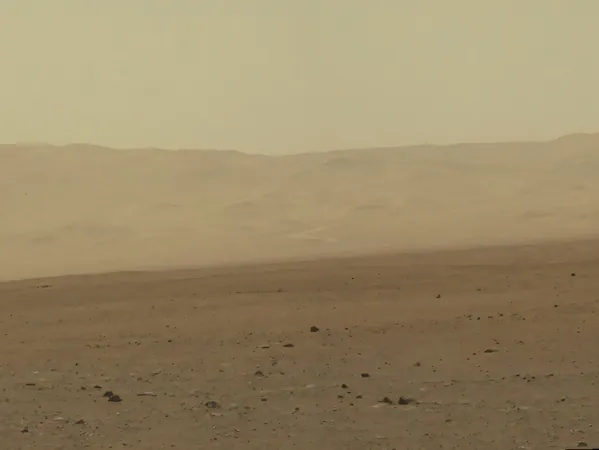
Mystery of Martian Desert: Rover Uncovers Life's Clue!
2025-07-05
Author: Sarah
Why is the surface of Mars a desolate wasteland while Earth flourishes with life? A groundbreaking find by a NASA rover may shed light on this cosmic enigma, revealing that although Mars once had rivers flowing across its surface, it was ultimately condemned to become a barren desert.
Despite Mars possessing nearly all the essential ingredients for life, it seems to lack the most critical element: liquid water. Yet, its landscape is marked with ancient riverbeds and lake deposits, suggesting that conditions were once suitable for life.
Currently, multiple rovers are exploring Mars in search of signs of ancient life that may have thrived during its more hospitable epochs millions of years ago. This year, NASA’s Curiosity rover made a significant discovery: rocks abundant in carbonate minerals.
These carbonates, akin to limestone on Earth, function as sponges, absorbing carbon dioxide from the atmosphere and entombing it within rock.
Recent research published in the journal "Nature" models how these carbonate formations could revolutionize our comprehension of Mars's past.
Mars’ Water Wonderland and Its Quick Departure
Edwin Kite, lead author and planetary scientist from the University of Chicago, noted that evidence points to brief periods of livability on Mars, describing them as "oases" amidst an otherwise harsh reality. Whereas Earth maintains a balanced climate cycle thanks to carbon dioxide recycling through volcanic eruptions, Mars experiences minimal volcanic activity.
This lack of volcanic outgassing means Mars's climate remains cold and inhospitable. The research indicates that any liquid water on the Martian surface was fleeting, likely followed by prolonged periods—up to 100 million years—of desolation.
The Quest for Hidden Water
Despite its harsh conditions, Kite remains hopeful that there may be concealed pockets of liquid water beneath Mars's surface waiting to be discovered. NASA’s Perseverance rover, stationed at an ancient Martian delta since 2021, has also identified carbonates near what used to be a lake.
The scientific community is eager to uncover more carbonate evidence. The most compelling proof would come from returning rock samples to Earth—a race currently underway between the United States and China, aiming for the next decade.
Are We Alone in the Universe?
Ultimately, this research aims to answer a fundamental question: just how common are Earth-like planets capable of sustaining life? Since the early 1990s, astronomers have discovered nearly 6,000 exoplanets. However, the only planets from which we can examine rock samples to unravel their histories are Mars and Earth.
If research confirms that Mars never nurtured even the simplest micro-organisms during its watery phases, it could imply that life’s emergence across the cosmos is fundamentally rare. Conversely, discovering remnants of ancient Martian life would suggest that life has a better chance of arising on celestial bodies than previously thought.



 Brasil (PT)
Brasil (PT)
 Canada (EN)
Canada (EN)
 Chile (ES)
Chile (ES)
 Česko (CS)
Česko (CS)
 대한민국 (KO)
대한민국 (KO)
 España (ES)
España (ES)
 France (FR)
France (FR)
 Hong Kong (EN)
Hong Kong (EN)
 Italia (IT)
Italia (IT)
 日本 (JA)
日本 (JA)
 Magyarország (HU)
Magyarország (HU)
 Norge (NO)
Norge (NO)
 Polska (PL)
Polska (PL)
 Schweiz (DE)
Schweiz (DE)
 Singapore (EN)
Singapore (EN)
 Sverige (SV)
Sverige (SV)
 Suomi (FI)
Suomi (FI)
 Türkiye (TR)
Türkiye (TR)
 الإمارات العربية المتحدة (AR)
الإمارات العربية المتحدة (AR)